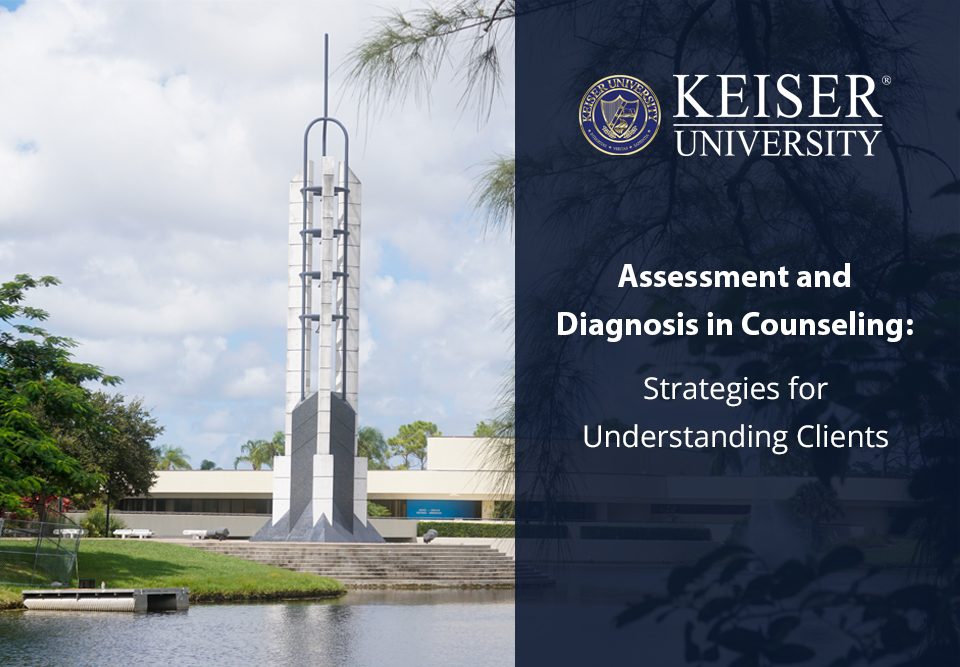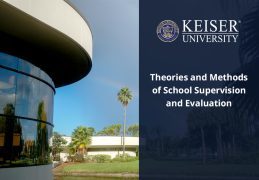Before you can begin providing a client with mental health counseling services, you will need to assess their current circumstances and develop a diagnosis. Assessment and diagnosis in counseling allows you to formulate a personalized plan designed to address the unique needs of your clients, making this a critical part of the process.
Importance of Assessment and Diagnosis in Counseling
Assessment in counseling is often the crucial first step of the therapeutic process, and it requires the therapist to develop an in-depth understanding of their client. According to a Pearson eTextbook, clinical assessment involves collecting information and data to evaluate and analyze the client’s current state of mind and overall well-being. Assessment and diagnosis is incredibly important because it allows you, as the therapist, to understand where the client is at and create a strategic plan that will allow them to get to where they need to be.
Setting the Stage: Why Understanding Clients Is Crucial
Accurate assessment and diagnosis in counseling is vital because:
- It allows you to create a baseline of where the client is at in terms of mental, emotional and physical well-being.
- It gives you an opportunity to personalize your approach to counseling to meet the unique needs of your client.
- It allows you to effectively advocate for your client and ensure that they have access to the resources they need to achieve their personal counseling goals.
What Is Assessment and Diagnosis in Counseling?
Assessment is considered to be the cornerstone of the entire counseling process, as it allows the therapist to develop an in-depth understanding of their client and formulate a strategy to help their client move forward and progress. Assessment is defined as the process in which a therapist collects data and information about their client, while clinical diagnosis is defined by the American Psychological Association as the process of using assessment techniques to identify the signs and symptoms of a mental health condition or disorder.
Fundamentals of Counseling Assessment
Throughout history, the fundamentals of counseling assessment have remained the same. Therapists and counselors rely on assessment techniques to develop a well-rounded understanding of their clients. However, in recent years, advances in technology have allowed counselors to begin using superior data collection methods to improve the precision and efficiency of their assessment process.
Types of Counseling Assessments
There are various types of counseling assessments that you can utilize, including both formal and informal strategies. Some of the most common types of counseling assessments include:
- Questionnaires — Questionnaires are commonly used because they help standardize the assessment process and provide counselors with a baseline understanding of their clients.
- Rating Scales — Rating scales allow clients to provide deeper insight into their experiences and feelings, giving counselors a more personalized look at their current state of mind.
- Clinical Interviews — Commonly used during a consultation or introductory meeting, clinical interviews are easily customized and allow the counselor to take a personalized approach to the assessment process.
Most counselors rely on several assessment methods, particularly when they are looking to make a clinical diagnosis for their client.
Importance of Assessment in Therapeutic Relationship
Assessment not only helps you develop an understanding of your client, but it also forms the critical first components of the therapeutic relationship. Additionally, assessment helps define the client-specific goals of treatment and lays the groundwork for that journey. Through your assessment process, your client is also getting to know you better, and developing a sense of trust in you. This is why it’s important to select strategic assessment strategies that will allow you to connect with your client while simultaneously gathering information.
Understanding the Diagnostic Process
The diagnostic process in counseling requires you to rely on assessment techniques to develop a clinical diagnosis. From there, you can create a treatment plan, but the diagnostic process then requires you to also evaluate the effectiveness of that treatment plan. In many cases, you will have to continue to monitor and evaluate the client, and adjust accordingly, so that you can provide your client with the best possible results.
Significance of Diagnosis in Counseling
As noted by an Abnormal Psychology course on Lumen Learning, diagnosis in counseling plays a critical role in the clinical assessment process. Without a proper diagnosis in place, a counselor is not able to create an effective treatment plan for their client. Through assessment and diagnosis in counseling, you will be able to develop progressive treatment options for your clients that will allow them to grow and improve over time.
Common Diagnostic Tools and Methods
Typically, multiple diagnostic tools and methods are used as part of the clinical diagnosis process. Therapists may rely on:
- Information the patient reports regarding their thoughts, experiences and current feelings.
- Observation of the patient’s habits, tendencies, behaviors and expressions while talking with them during the assessment process.
- Data collected during the mental health examination, in which the counselor discusses the client’s health history, personal history and background, current circumstances and any self-reported symptoms that the client may be experiencing at the time.
Addressing Ethical Considerations in Diagnosis
Of course, you also must be mindful of ethical considerations as you are assessing and diagnosing your clients. Some of the top ethical issues during diagnosis include:
- Stigmatization — Despite recent advocacy efforts, there is still a stigma that surrounds mental health. It’s crucial that therapists avoid making clients feel as if they are being stigmatized by their diagnosis.
- Labeling — For many, a mental health diagnosis becomes a lasting label that impacts their overall identity. Gently revealing a diagnosis, combined with factual data and information, can help you avoid making your client feel as if they are being labeled by a mental health condition or disorder.
- Confirmation Bias — It is essential that you begin each assessment with an open mind and avoid working to find proof of a diagnosis that you assume exists.
Resources for Effective Counseling Assessment
Mental health professionals often rely on a variety of resources to assess their clients accurately and effectively. By being aware of the best resources in the industry, and constantly working to improve your own assessment methods, you will be able to continue to grow your counseling practice over time.
Assessment Tools and Instruments
Some of the top counseling assessment tools and instruments include:
- Psychological Tests and Assessments
- Rating Scales
- Question-and-Answer Worksheets
Most counselors and therapists use several assessment tools during the clinical diagnosis process to provide their clients with an accurate, precise diagnosis. By using the best tools and resources in the industry, you will be able to reduce the risk of confirmation bias and provide your clients with an accurate diagnosis.
Digital Platforms for Assessment
There are a growing number of digital platforms for assessment that can allow you to streamline the assessment process and collect more accurate information from your clients. These digital platforms are anchored by the latest technology, and they have been shown to increase the accessibility of mental health counseling. This is because it makes it easier for more people to connect with a therapist and receive a diagnosis.
Continuing Education Opportunities
In addition to using the most reliable tools in the industry, as well as the latest digital platforms for assessment, you can take advantage of continuing education opportunities to continue to enhance your assessment and diagnosis procedures. Whether you decide to pursue a master’s degree in counseling or you enroll in a webinar that focuses exclusively on assessment techniques, you will find that prioritizing your education allows you to future-proof your career as a mental health counselor.
Client-Centered Approaches to Assessment
To provide your clients with personalized service and attentive care during their mental health counseling sessions, you will want to first take a client-centered approach to assessment. The client-centered approach to assessment requires you to remain objective and non-judgmental throughout the entire assessment process to develop a deep sense of trust in your client. This approach will allow you to collect as much information as possible and ultimately make a more accurate diagnosis.
Person-Centered Assessment
Person-centered assessment requires you to focus entirely on the client that you are working with at the time, and to avoid the temptation of confirmation bias. Rather than assuming that you know which diagnosis you are looking for, and searching for the signs or symptoms that would confirm your beliefs, you should begin with an objective assessment process that takes into consideration the entire picture.
Tailoring Assessments to Clients
Ultimately, you will want to tailor your assessment approach to meet the unique needs of the client. Some clients may be apprehensive about the counseling process, and you may need to use a gentle approach with more open-ended techniques to gather the information you need. Others may feel more comfortable answering questions or rating their feelings on a scale rather than beginning the assessment with a conversation. Over time, you will develop the intuition needed to quickly determine which assessment and diagnosis methods will work best for individual clients.
Holistic Understanding of Clients
While it can be easy to become consumed with the precision of your diagnosis and the symptoms that a client is experiencing, it’s important to use the assessment process to develop a holistic understanding of your clients. By taking a broad look at your client’s overall feelings and experiences, you will be able to assess your client more fully and accurately.
Emphasizing Strengths-Based Assessment
Strengths-based assessment is an effective process that focuses more on the client’s individual strengths rather than their weaknesses and shortcomings. This type of assessment process is more likely to result in a positive therapeutic relationship, and it helps the client to recognize that they are resilient and capable of growth.
Multiple Perspectives Assessment
In a multiple perspectives assessment, you take both your perception as well as your client’s perspective into account during the diagnostic process. It is considered to be a more holistic approach to assessment and is becoming increasingly popular in the field.
Prepare for a Career in Mental Health Services at Keiser University Graduate School
At Keiser University Graduate School, we offer a Master of Science in Clinical Mental Health Counseling that allows you to take an in-depth look at clinical diagnosis and other elements involved in mental health counseling services. This advanced counseling degree program is designed to provide you with the skills and knowledge needed to apply for counseling licensure and pursue independent practice.
Request more information about our online graduate degree programs today.






 My instructors believed in me. They were more than instructors, they tried to get to know you as a person and tried to understand your goals so they could push you towards them. Student services helped me find a job before I even graduated. Everyone was dedicated to my overall success.
My instructors believed in me. They were more than instructors, they tried to get to know you as a person and tried to understand your goals so they could push you towards them. Student services helped me find a job before I even graduated. Everyone was dedicated to my overall success.
